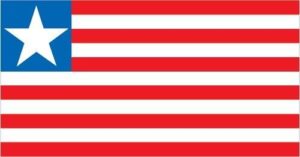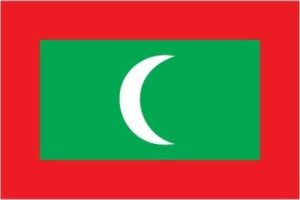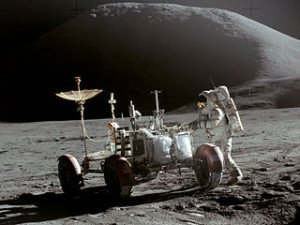 Liberia celebrates Independence Day. In 1816 freed slaves settled in a town in Africa later named Monrovia. The colony grew and became the first republic in Africa in 1847. The country is about the size of Tennessee, and it has a tropical climate. Agricultural products include coffee, cocoa, bananas, and rice. Almost four million people live there, and most of the major cities are along the Atlantic coast. Monrovia remains the capital.
Liberia celebrates Independence Day. In 1816 freed slaves settled in a town in Africa later named Monrovia. The colony grew and became the first republic in Africa in 1847. The country is about the size of Tennessee, and it has a tropical climate. Agricultural products include coffee, cocoa, bananas, and rice. Almost four million people live there, and most of the major cities are along the Atlantic coast. Monrovia remains the capital.

Flag of Maldives
Maldives celebrate Independence Day. Great Britain gave up control of the coral islands in 1965. About 1,200 islands make up this country located in the Indian Ocean. In total the area of the islands is about 1.7 times the area of the Washington, DC. Almost 400,000 people live there, and many derive their income from the tourist industry. Male is the capital.

New York Flag
New York became the eleventh state of the United States by ratifying the Constitution in 1788. Giovanni de Verrazano entered New York Bay in 1524. In 1609 Henry Hudson explored the area. Peter Minuit bought Manhattan Island from the Indians in 1625 and named the colony New Amsterdam. In 1664 the British attacked and won the territory. They renamed the land New York, after the Duke of York. The state’s nickname is the “Empire State,” and the capital is Albany. New York, New York continues to be a leading power in commerce and industry.
Book printed in and about Esperanto was published for the first time in 1887. L. L. Zamenhof wrote Unua Libro. Children could visit a website discussing Esperanto at: Esperanto. Children could also read almost 100 books in Esperanto at: Project Gutenberg.

Irwin with Lunar Rover I
Apollo 15 was launched in 1971. Astronauts David Scott and James Irwin landed safely on the moon on July 30 and used a four-wheeled vehicle, Rover 1, to travel across the surface. Astronaut Alfred Worden remained in the command module, Endeavor. The crew returned safely to earth on August 7, 1971. Apollo 15 was the fourth crewed mission to land on the moon. Children can learn more at: Apollo 15.